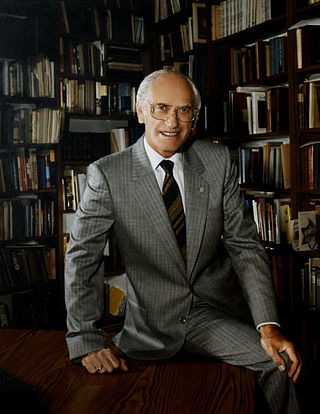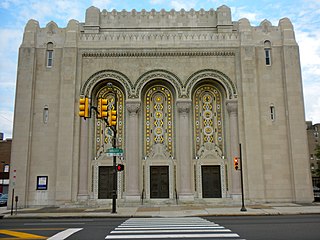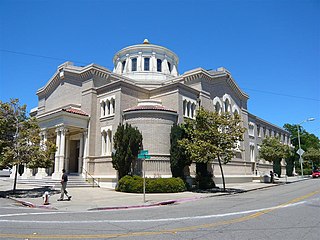Related Research Articles

The Messiah in Judaism is a savior and liberator figure in Jewish eschatology who is believed to be the future redeemer of the Jews. The concept of messianism originated in Judaism, and in the Hebrew Bible a messiah is a king or High Priest of Israel traditionally anointed with holy anointing oil.
Adherents of Judaism do not believe that Jesus of Nazareth was the Messiah nor do they believe he was the Son of God. In the Jewish perspective, it is believed that the way Christians see Jesus goes against monotheism, a belief in the absolute unity and singularity of God, which is central to Judaism; Judaism sees the worship of a person as a form of idolatry, which is forbidden. Therefore, considering Jesus divine, as “God the Son”, is forbidden. Judaism's rejection of Jesus as the Messiah is based on Jewish eschatology, which holds that the coming of the true Messiah will be associated with events that have not yet occurred, such as building the Third Temple, a Messianic Age of peace, and the ingathering of Jews to their homeland.

Wolf Gunther Plaut, was an American Reform rabbi and writer who was based in Canada. Plaut was the rabbi of Holy Blossom Temple in Toronto for several decades and since 1978 was its senior scholar.
A seudat mitzvah, in Judaism, is an obligatory festive meal, usually referring to the celebratory meal following the fulfillment of a mitzvah (commandment), such as a bar mitzvah, bat mitzvah, a wedding, a brit milah, or a siyum. Seudot fixed in the calendar are also considered seudot mitzvah, but many have their own, more commonly used names.

Agudath Israel Etz Ahayem, transliterated from Hebrew to mean the Congregation of Israel Tree of Life, is a Conservative Jewish synagogue located at 3525 Cloverdale Road in Montgomery, Alabama, in the United States.

Congregation Beth Elohim, also known as the Garfield Temple and the Eighth Avenue Temple, is a Reform Jewish congregation and historic synagogue located at 274 Garfield Place and Eighth Avenue, in the Park Slope neighborhood of Brooklyn in New York City, New York, United States.

KAM Isaiah Israel is a Reform Jewish congregation and synagogue located at 1100 East Hyde Park Boulevard in the historic Kenwood neighborhood of Chicago, Illinois, in the United States. It is the oldest Jewish congregation in Chicago, with its oldest core founded in 1847 as Kehilath Anshe Ma'arav.

Rabbi Wolf Gold was a rabbi, Jewish activist, and one of the signers of the Israeli declaration of independence.
Breira was an organization founded to express a left-wing position on Israel. Formed in 1973, it lasted until 1977.

Congregation Rodeph Shalom, is an historic Reform Jewish congregation and synagogue located at 615 North Broad Street, Philadelphia, Pennsylvania, in the United States. Established in 1795, it is the oldest Ashkenazic synagogue in the Western Hemisphere. It is noted historically for its leadership of the Reform movement among American Hebrew congregations, for its spiritual influence upon international Jewry, and for its unique 1927 Byzantine and Moorish Revival synagogue building, with Art Deco finishes, on North Broad Street, listed on the National Register of Historic Places since 2007.

Temple Sinai is a Reform Jewish congregation and synagogue located at 2808 Summit Street in Oakland, California, in the United States. Founded in 1875, it is the oldest Jewish congregation in the East San Francisco Bay region.
Beth Israel Congregation is a Reform Jewish congregation and synagogue located at 5315 Old Canton Road in Jackson, Mississippi, in the United States. Organized in 1860 by Jews of German background, it is the only Jewish synagogue in Jackson. Beth Israel built the first synagogue in Mississippi in 1867, and, after it burned down, its 1874 replacement was at one time the oldest religious building in Jackson.
Congregation Am Tikvah is a combined Conservative and Reform Jewish congregation and synagogue located at 625 Brotherhood Way in San Francisco, California, in the United States. The congregation was formed in 2021 as the result of the merger of the Conservative B'nai Emunah and the Reform Beth Israel Judea congregations, with the latter formed in 1969 through a merger of the Conservative Congregation Beth Israel and the Reform Temple Judea. The congregation is affiliated with both the Union for Reform Judaism and the United Synagogue of Conservative Judaism.
Asher Lopatin is the Director of Community Relations at the Jewish Federation of Greater Ann Arbor. He is an American pluralist, Open Orthodox rabbi and leader of Kehillat Etz Chayim, an Open Orthodox synagogue in Oak Park, MI. He is also the founder and executive director of the Detroit National Center for Civil Discourse, which has run a Fellowship in Civil Discourse at Wayne State University since September 2019. Previously, he was the President of Yeshivat Chovevei Torah (2013-2018) and the spiritual leader of Anshe Sholom B'nai Israel Congregation in Chicago before that. He is a Rhodes Scholar and a Council on Foreign Relations member.

Temple Israel is a Reform Jewish congregation and synagogue, located at 130 Riverside Drive in Dayton, Ohio, in the United States.
Makom Solel Lakeside is a Reform Jewish congregation and synagogue, located at 1301 Clavey Road, in Highland Park, on the North Shore of Chicago, Illinois, in the United States. The congregation traces its roots through the Lakeside Congregation for Reform Judaism, formed in 1955, and Congregation Solel, formed in 1957. The two Reform congregations merged in 2019 and currently serve more than 500 households.

Congregation Beth Jacob Ohev Sholom is an Orthodox Jewish synagogue located at 284 Rodney Street in Williamsburg, Brooklyn, in New York City, New York, United States. The congregation follows the Ashkenazi rite.

Temple Israel is a Reform Jewish congregation and synagogue located at 2004 East 22nd Place in Tulsa, Oklahoma, in the United States. Founded in 1914, the congregation affiliated with the Union for Reform Judaism in 1915, and constructed its first building on the corner of 14th and Cheyenne Streets in 1919. Early rabbis included Jacob Menkes, Charles Latz, Samuel Kaplan, Jacob Krohngold, and Benjamin Kelsen.

Reform Congregation Keneseth Israel, abbreviated as KI, is a Reform Jewish congregation and synagogue located at 8339 Old York Road, Elkins Park, just outside the city of Philadelphia, Pennsylvania, in the United States. Founded in Philadelphia in 1847, it is the sixth oldest Reform congregation in the United States, and, by 1900, it was one of the largest Reform congregations in the United States. The synagogue was at a number of locations in the city before building a large structure on North Broad Street in 1891, until 1956 when it moved north of the city to suburban Elkins Park.
Temple Israel is the oldest of eleven Progressive synagogues in South Africa. It is a provincial heritage site, built in the Art Deco style by architect Hermann Kallenbach. It is located in the Johannesburg suburb of Hillbrow. It is an affiliate of the South African Union for Progressive Judaism (SAUPJ), which is part of the World Union for Progressive Judaism (WUPJ).
References
- 1 2 Jensen, Trevor. "Rabbi Arnold Jacob Wolf, 1924-2008: Led 2 prominent Reform Jewish congregations" Archived 2008-12-29 at the Wayback Machine , Chicago Tribune , December 25, 2008. Accessed December 30, 2008.
- ↑ Gips, Terry. "Eco-Kosher: Can I Care About the Earth and Still Eat My Lox, Bagels and Cream Cheese?" Archived October 10, 2008, at the Wayback Machine , The Alliance for Sustainability, dated April 30, 1994. Accessed December 30, 2008.
- 1 2 3 4 5 6 7 8 Fox, Margalit. "Arnold Jacob Wolf, a Leading Reform Rabbi, Is Dead at 84", The New York Times , December 29, 2008. Accessed December 30, 2008.
- 1 2 Newbart, Dave. "Prominent rabbi, friend of Obama, dies at 84" Archived 2008-12-25 at the Wayback Machine , Chicago Sun-Times , December 24, 2008. Accessed December 30, 2008.
- ↑ Staff. "Rabbi to get his belated bar mitzvah: 13 too young -- 'that's why I'm doing it at 83'", Chicago Sun-Times , March 27, 2007. Accessed December 30, 2008.
- ↑ Yearwood, Paula Dubkin. "BAR MITZVAH, OLD MAN: At age 83, Rabbi Arnold Jacob Wolf is finally having his big day" Archived June 15, 2011, at the Wayback Machine , Chicago Jewish News , March 23, 2007. Accessed December 30, 2008.
- ↑ Commentary Magazine "State of Jewish Belief", dated August 1966. Accessed January 29, 2021
- ↑ Birkner, Gabrielle. "Rabbi Arnold Jacob Wolf, 84, a Champion of Peace and Progressive Politics", The Forward , December 26, 2008. Accessed December 30, 2008.
- ↑ Krieger, Hilary Leila. "Mr. Obama's neighborhood" [ permanent dead link ], The Jerusalem Post , October 23, 2008. Accessed December 30, 2008.